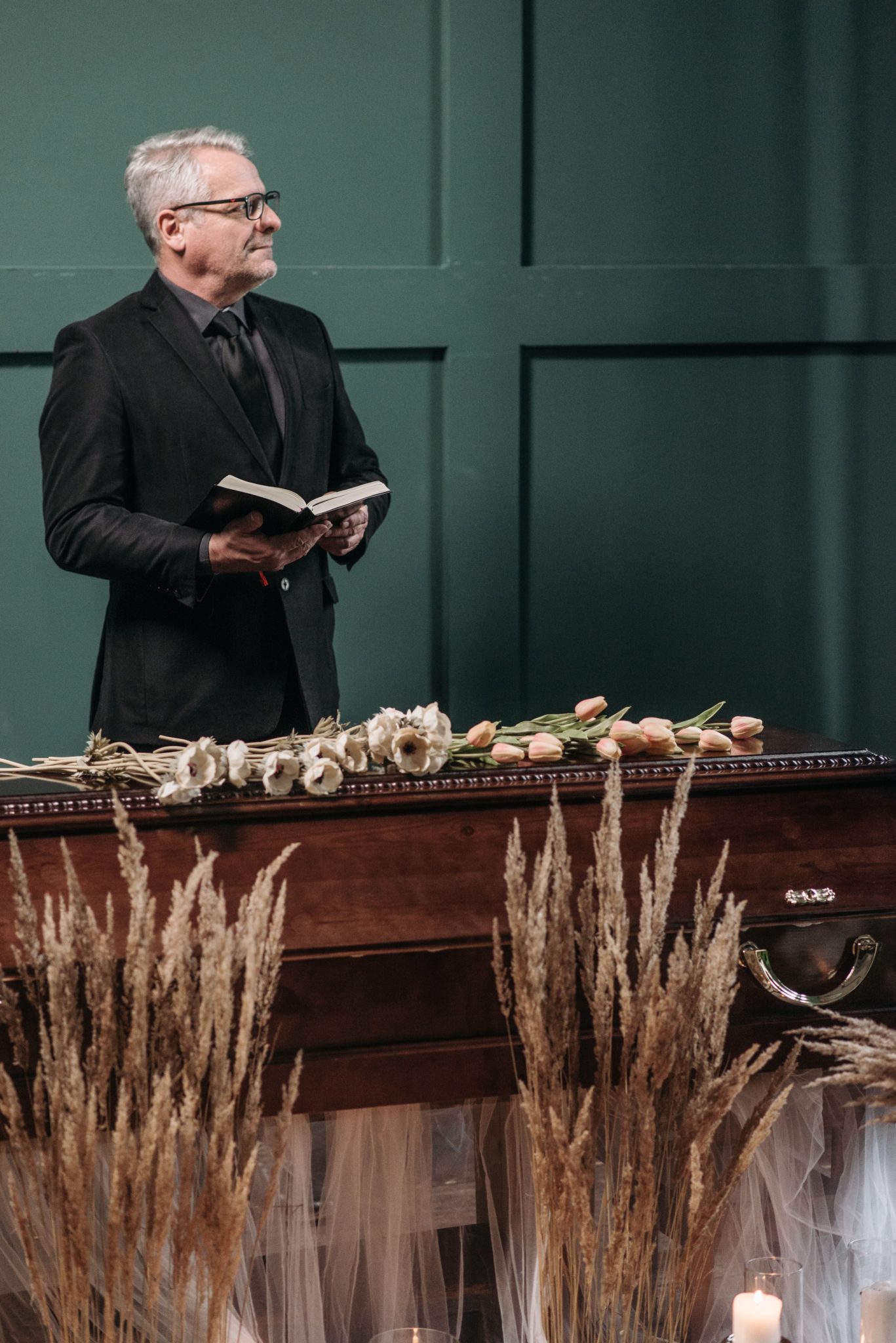
If you are in the process of planning a funeral, you may be wondering who will you be working with and how the duties of each person involved are defined. The funeral celebrant is one of the most important roles in a funeral, as they coordinate and conduct the many moving parts of the ceremony. Whether you’re planning a traditional funeral or a living funeral, take time to consider who will be the best funeral celebrant for your service. No matter what you plan or who you choose, it is important to find a celebrant who can create a comfortable atmosphere and help you define and realize your wishes for the event.
What is a funeral celebrant?
Simply put, a funeral celebrant is a person who conducts a funeral. You can think of them as the main host for the event. A funeral celebrant is sometimes referred to as a funeral conductor or funeral officiant. This person makes sure the event runs smoothly by leading each segment and aiding in the transition between them.
Whether your funeral celebrant is religious, semi-religious, spiritual, or non-religious is a personal choice. Generally, the funeral celebrant aims to reflect and celebrate the life of the person who has passed.
If you do not have someone in mind already, your local funeral home or funeral director can usually provide a few recommendations on funeral celebrants. They may have contacts with local religious groups, non-religious ceremony leaders, or even in-house staff with funeral celebrant certification or specialized training.
Funeral officiant duties
Often, the funeral celebrant serves as the main speaking role in the funeral service. A funeral celebrant or officiant is usually responsible for sharing the eulogy of the person who died. In many cases, the funeral celebrant will play a large role in writing the eulogy as well. If you are holding a religious memorial service, the celebrant may also lead prayers or read from religious texts.
Planning the ceremony. An experienced funeral celebrant can also help you plan and develop a structure for the ceremony. Every ceremony is different, so the celebrant can provide you with ideas on what to include and help you organize them accordingly. If you want the celebrant to play a significant role in the planning process, be sure to communicate that upfront to confirm that the celebrant is comfortable and experienced in this process. A good funeral celebrant will be willing to work with you closely, ready to offer ideas, and prepared to be flexible in personalizing the event for your loved one’s memory.
Reading and writing the eulogy. While some people may prefer to write a eulogy themselves, many are more comfortable putting the funeral celebrant in charge of this task. Experienced celebrants will be familiar with the process and can guide you through it. They may ask you questions about your loved one’s life, character, values, and close friends and family. You may want to share personal stories, memories, or photos to help share their story more fully.
Incorporating poems, songs, hymns, and/or music. Many people choose to incorporate poems, songs, hymns, or music into the ceremony. They may select their loved one’s favorites or they may seek recommendations from the funeral celebrant for options that suit their loved one’s personality or the ceremony. In addition to those recommendations, a celebrant can also help to plan how and when these items are incorporated into the service.
Inviting others to speak. Close friends or family members are often invited to speak during the ceremony. They may share personal stories, inspirational messages, or lead prayers or a moment of silence. Be sure to let those speakers know as soon as possible so they have ample time to prepare. The speakers may also work with the celebrant directly to rehearse their speeches and plan the order in which they will speak. How many speakers and how long they speak will depend on the length of the ceremony.
Graveside service or scattering ashes. A graveside service or an ash-scattering ceremony is sometimes held after a funeral. These events may be open to all or limited to close friends and family. There may be additional speeches, prayers, or music during this time. This is usually an intimate event, and a good funeral celebrant can help you plan and personalize it accordingly.
How much does a funeral celebrant cost?
Although price isn’t the only factor in choosing a funeral celebrant, it is an important one. The cost of a funeral celebrant will vary greatly depending on who you choose, how long your ceremony will last, and how involved in the planning process you would like them to be. This could place the cost anywhere between $250 to $1,000 or more.
Most of the time, funeral celebrants are independent contractors. Naturally, their rate will also depend on their level of experience, the local market conditions, and other factors. Some may charge a flat fee, while others may use an hourly rate structure. You may want to talk with a few different local funeral celebrants to compare prices and services. Be sure to ask what sorts of duties are included in your quoted prices, and mention if there are any particular needs you have.
Who can conduct a funeral? And who should?
Anyone can conduct a funeral service, at any level of experience. There are no legal or formal requirements for who can and cannot lead a funeral, although there are certifications available for those who act as celebrants as a career. Deciding exactly who will conduct your loved one’s funeral is an extremely personal choice.
Some people prefer to select a religious leader who fits the beliefs of the deceased, while others may choose a civil celebrant or non-denominational one who has experience leading a funeral. Many funeral directors fall into this category. It is not uncommon to select a celebrant with no experience at all. A close friend, family member, or loved one of the deceased may be selected to lead the funeral simply because they know the person well and are comfortable directing the event.
Religious leader
If your loved one’s faith played a significant role in their life, you may prefer to select a religious leader or member of the clergy as your funeral celebrant. If your loved one knew a local religious leader personally, this may be the best person to ask. Their personal relationship with your loved one will help with the planning and personalization of the ceremony.
Even if the religious leader you select does not know your loved one personally, you will be able to share information about them to help the celebrant understand who they were as a person. Offering photos, telling stories, and describing your loved one’s personality to the celebrant can help provide them with a fuller picture of the deceased person’s life.
Funeral director
While a funeral celebrant and a funeral director are not the same, many funeral celebrants also hold a funeral director license. Many funeral directors also undergo training to become a certified funeral celebrant. If your funeral director or someone on their staff is willing and able to serve as a funeral celebrant, this can be a convenient choice.
Because they have been involved with other parts of the funeral planning process, your funeral director will already have some information about your loved one, a good idea of your preferences, and a working relationship with you. If you choose to hold the ceremony at the funeral home, they will also be familiar with the venue and the technology there to support slideshows, music, and microphones.
Civil celebrant
If you prefer to plan a ceremony with no religious affiliation, a civil celebrant may be a good option. A civil celebrant can be incredibly helpful in planning the order of events without following any particular religious traditions. However, many people who work with a civil celebrant still choose to include some prayers, hymns, or religious readings for comfort. With the help of a civil celebrant, you will be able to mix and match different elements to create a truly personal ceremony.
A friend, family member, or yourself
Because there are no legal requirements to lead a funeral, a friend, family member, or you yourself may prefer to lead the funeral. This can be a tremendous gesture. However, if you would like to go this route, it is important that you or the person you select is comfortable with public speaking, able to hold their composure, and willing to provide creative input to ensure a smooth and memorable ceremony. If you are planning a memorial service with many personal touches, this can be an excellent choice.
Planning a funeral can be an intense, emotional journey, but don’t forget that, above all, this is an opportunity to celebrate the life of someone special. No matter how you choose to memorialize the deceased, be sure to take this opportunity to feel more connected to the ones you love.
If you would like to learn more about funeral arrangements or funeral pre-planning, our professional staff can help answer your questions and meet your needs. Contact us today.



Recent Comments